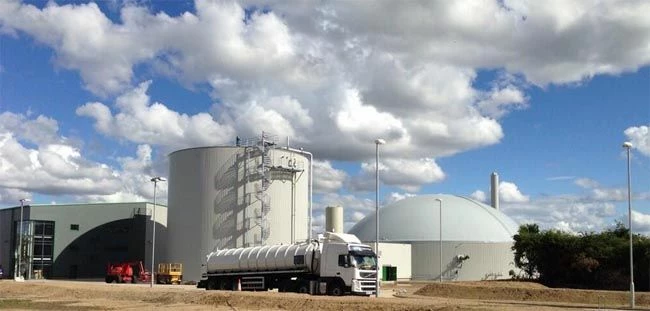
Partner Article
Firms to benefit from Anaerobic Digestion plant
Food producers across Teesside have more ways to slash waste costs - thanks to the region’s first commercial Anaerobic Digestion (AD) plant.
Emerald Biogas, a 1.56 megawatt energy plant at Newton Aycliffe, will chew up 50,000 tonnes of leftovers from the hotels, takeaways and restaurants of Teesside each year.
Companies such as SK Chilled Foods, which employs more than 550 people across three sites at Wynyard, South Bank and Riverside Park Industrial Estate, have already teamed up with the project.
And bosses are sending a call to action for more companies to help address the 7.8m tonnes-a-year UK food waste mountain generated by commercial outfits.
They say the technology they’ve brought to the region will help firms cut their waste costs.
SK Chilled Foods will send all the waste from its range of Indian, Oriental, Mediterranean, American and Tex Mex snack foods and ready meals to the new plant.
Tony Harvey, SK Chilled Foods manufacturing director, said: “As a UK food producer, we take waste management very seriously and will be working with Emerald Biogas to divert all our food waste from landfill.
“This is both an environmental and commercially viable strategy for us, as it will enable the company to reduce food waste management costs across all three of our sites while managing our waste responsibly.”
Antony Warren, director of Emerald Biogas, is actively encouraging more companies to think of AD as a viable option for their waste.
He said: “Currently only seven per cent of the commercial food waste generated annually is sent to AD facilities and we would like to see a dramatic increase to divert such waste from landfill.
“We have employed the latest technology to make AD a feasible and cost effective alternative for commercial organisations in the North-east.”
AD is used widely across Europe, and now it’s reached the North-east there are plans by Emerald Biogas for more energy generation.
Three further phases have been granted planning permission.
The first of which will double the capacity and power generation of the facility, allowing up to 100,000 tonnes of food waste to be processed each year.
This was posted in Bdaily's Members' News section by Martin Walker .
Enjoy the read? Get Bdaily delivered.
Sign up to receive our daily bulletin, sent to your inbox, for free.








 Raising the bar to boost North East growth
Raising the bar to boost North East growth
 Navigating the messy middle of business growth
Navigating the messy middle of business growth
 We must make it easier to hire young people
We must make it easier to hire young people
 Why community-based care is key to NHS' future
Why community-based care is key to NHS' future
 Culture, confidence and creativity in the North East
Culture, confidence and creativity in the North East
 Putting in the groundwork to boost skills
Putting in the groundwork to boost skills
 £100,000 milestone drives forward STEM work
£100,000 milestone drives forward STEM work
 Restoring confidence for the economic road ahead
Restoring confidence for the economic road ahead
 Ready to scale? Buy-and-build offers opportunity
Ready to scale? Buy-and-build offers opportunity
 When will our regional economy grow?
When will our regional economy grow?
 Creating a thriving North East construction sector
Creating a thriving North East construction sector
 Why investors are still backing the North East
Why investors are still backing the North East